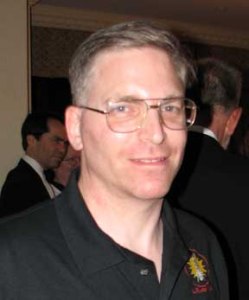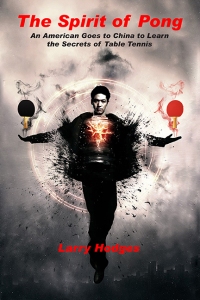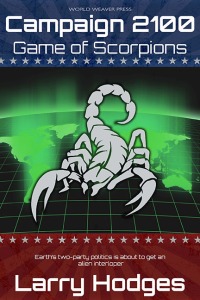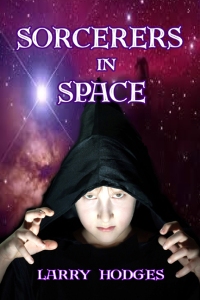MICHAEL A. VENTRELLA: I’m pleased to be interviewing author Larry Hodges today. His web page is here. Larry, tell us about your latest work!
LARRY HODGES: My new novel, CAMPAIGN 2100: GAME OF SCORPIONS (from World Weaver Press), dramatizes and satirizes politics in a new sub-genre, campaign science fiction.  The novel covers the election for president of Earth in the year 2100, when the world has adopted the American two-party electoral system. A father decides to buck the system and run for president of Earth, taking on his own daughter with a third-party moderate challenge – with an incredulous alien ambassador along for the ride.
The novel covers the election for president of Earth in the year 2100, when the world has adopted the American two-party electoral system. A father decides to buck the system and run for president of Earth, taking on his own daughter with a third-party moderate challenge – with an incredulous alien ambassador along for the ride.
Presidential politics has dominated the news for years, and few stories are more compelling than a bare-knuckle, fight-to-the-finish political campaign. And yet, where are the SF stories that cover this? CAMPAIGN 2100 is West Wing in the 22nd Century. The underlying theme of the novel is moderation in politics; some will read it as a Moderate Manifesto.
VENTRELLA: How did you go about finding a publisher?
HODGES: One of the toughest decisions for a new author is whether to try and get an agent, or go directly to publishers. I decided to try both, and sent numerous queries. For agents, I mostly used http://www.agentquery.com. For publishers, I mostly used http://www.ralan.com. It took three years – three years of checking email every three minutes – but then, one day, I received a note from a publisher that they really liked the novel – only . . . [and there followed a list of things that they’d like to see rewritten]. I did the rewrite. With the publisher’s blessing, I also had the novel critiqued at The Never-Ending Odyssey (an annual writer’s workshop for graduates of Odyssey), and did more rewriting from that. I sent the rewrite to the publisher, and from there on I checked email every three seconds for many months. And then came the response, which I printed out and put on my bulletin board: “I’m pleased to offer you publication with World Weaver Press for the novel CAMPAIGN 2100: GAME OF SCORPIONS…”
VENTRELLA: How did you first become interested in writing?
HODGES: I’ve been reading science fiction & fantasy since elementary school. It was inevitable that at some point I’d start writing it. My first story was “The Snowflake,” written circa seventh grade, which featured a guy read about a snowflake warning in the newspaper, and rants about how stupid that is, that they meant a snow warning. Then he sees the same snowflake warning on the TV, on the radio, from friends, and he keeps sarcastically correcting them. It ends with a giant snowflake falling onto and demolishing his house.
Surprisingly, it wasn’t science fiction that turned me into a professional writer – it was table tennis. Yes, ping-pong. In high school, when I wasn’t reading SF, I was training in this Olympic sport, and became first a top player, and then a top coach. (I’m in the USA Table Tennis Hall of Fame.) I began writing coaching articles, and then books on table tennis. I was hired as director and a coach for table tennis at the Olympic Training Center in Colorado Springs, and between training sessions, I began to write SF. I now have over 1600 published articles and eleven books – seven table tennis, five SF/fantasy, which adds up to twelve since one is a table tennis fantasy novel.
I began writing coaching articles, and then books on table tennis. I was hired as director and a coach for table tennis at the Olympic Training Center in Colorado Springs, and between training sessions, I began to write SF. I now have over 1600 published articles and eleven books – seven table tennis, five SF/fantasy, which adds up to twelve since one is a table tennis fantasy novel.
VENTRELLA: How do you make your protagonist a believable character?
HODGES: CAMPAIGN 2100 really has four main characters – an ensemble cast. I decided that each would get their own introductory chapter. Each had to have some major issue to deal with that affected the plot, while developing them as memorable characters.
• Toby, the de facto “main character” (since he’s the one running for president of Earth), is introduced in chapter one, which is five years before the rest of the novel. President Corbin Dubois is being sworn in as the new president of Earth – and Toby ran his campaign, assisted by daughter Lara. Only he now realizes he’s made a terrible mistake, thinking, What have I done? He’s supposed to stay on as Corbin’s political director, but decides to resign. Corbin blackmails him, threatening his daughter if he leaves, and Toby ends up staying – but leaves us with the cliffhanging thought, What can I do to fix this? His character is developed as he faces a huge conflict – his desire to fix his mistake in making Dubois president, while not destroying his daughter’s future. The novel really takes off when he finally goes to war with his own daughter! He is a gold mine of conflict – inner conflict over his past support of Dubois, his battle with his daughter, and various campaign issues; and external conflict as he runs for president against Dubois.
• Twenty-two, the alien ambassador, is introduced as she’s diving into Earth’s atmosphere on her way to landing at the seat of world government. She’s excited, wondering about this new world and its politics as she naively converses with her overly adoring ship’s computer. We learn a terrible secret about her, which the reader knows but no one in the story will learn of until the very end. And then we see the alien point of view during first contact – and how both sides react when it turns into a disaster.
• Bruce, who also helped Toby run the Dubois campaign (but quit early on when he realized it was a mistake), is a professional table tennis player. He’s introduced as he’s playing for the U.S. championship. His great intelligence and sarcasm is highlighted throughout, with him simultaneously carrying on four conversations (with his opponent, the umpire, people in the crowd, and his thought computer), and then, right when he’s about to win . . . he makes a big decision. He’s such a flamboyant character that he’s easy to write, but he can be irritating, and so it’s a high-wire act making sure he goes the Han Solo rather than the Jar Jar Binks route.
• Feodora, the tiny Russian general who is running for president, is built up in advance by hints about her almost super-hero status. When she’s introduced, she’s stuck in bureaucratic meetings, representing Russian in talks with China, Japan, Korea, and others. Her character is built up via the contrast between her somewhat whimsical and sarcastic comments there, and her contrasting thoughts.  (She’s practically a superhero, and so throughout the novel she is showcased doing over-the-top things.) We get a flashback history lesson on how she shot and killed the Russian lead general, took command of Russian troops, and led them to a surprising victory. Feodora originally wasn’t intended to be a major character, but when she first appeared halfway through the book in the first draft, she pretty much took over, dominating the story whenever she appeared. At the behest of critiquers, I rewrote the story so she could appear sooner. I also had to send her on various journeys to get her off the stage so the other characters could get attention!
(She’s practically a superhero, and so throughout the novel she is showcased doing over-the-top things.) We get a flashback history lesson on how she shot and killed the Russian lead general, took command of Russian troops, and led them to a surprising victory. Feodora originally wasn’t intended to be a major character, but when she first appeared halfway through the book in the first draft, she pretty much took over, dominating the story whenever she appeared. At the behest of critiquers, I rewrote the story so she could appear sooner. I also had to send her on various journeys to get her off the stage so the other characters could get attention!
VENTRELLA: Which of your characters was the hardest to write and why?
HODGES: The toughest was probably Toby, simply because I had to be careful that he wasn’t overshadowed by the interesting and flamboyant Twenty-two, Bruce, and Feodora. He was the heart of the story, as he struggled with his inner demons over his guilt in making Dubois president and taking on his own daughter, and his desire to make up for this by running for president. The other three were very easy to write, once I had their characters down – the naïve goody-goody with a secret alien; the brilliant in-your-face sarcastic Bruce; and the over-the-top almost superhero and yet soft-spoken Russian general Feodora. One key thing about writing all four of them is that I considered them all different facets of myself (or facets I wanted to be), and so would just become that part of me when I wrote that character.
VENTRELLA: Do you think readers want to read about “believable” characters or do they really want characters that are “larger than life” in some way?
HODGES: It’s a balancing act, but for the type of story I was writing, I needed larger than life characters, such as Feodora and Bruce. But they were balanced off by the far more believable Toby, who comes off as a more regular guy in an extraordinary and highly public position.
VENTRELLA: What makes your fiction unique? In other words, what is it about your stories that makes them stand out against all the other similar stories out there?
HODGES: I thought long and hard about what I wanted to write about, balancing my strengths and interests versus what readers might want to read. I think all new writers need to do this. I decided that I wanted to write at least three different novels, each one unique – and then I’d decide which of these sub-genres to focus on:
A political satire – CAMPAIGN 2100: GAME OF SCORPIONS. What was unique about this that it created a whole new SF subgenre – campaign science fiction. I asked myself the simple question (also noted above): “Presidential politics has dominated the news for years. Few stories are more compelling than a bare-knuckle, fight-to-the-finish political campaign. And yet, where are the SF stories that cover this?”
A humorous fantasy – SORCERORS IN SPACE. What was unique about this? It was potentially a new series that covered historical events but replaced the main characters with sorcerers. In this case, the novel covered the U.S.–Soviet space race of the 1960s, but with sorcerers instead of astronauts/cosmonauts. Maybe I could be the next Terry Pratchett!
A table tennis fantasy – THE SPIRIT OF PONG. What was unique about this? Well . . . how many table tennis fantasy novels are there?
VENTRELLA: Hey, come on. My novel BLOODSUCKERS: A VAMPIRE RUNS FOR PRESIDENT is also “campaign science fiction.” (INSERT SMILEY FACE)
What is your writing process? Do you outline heavily or just jump right in, for instance?
HODGES: This is another thing that new writers struggle with. When I first decided to write Campaign 2100, I spent a huge amount of time outlining it in great detail.  This is now some top writers operate, such as Connie Willis, who is famous for doing detailed outlines of every chapter – and then writing the novel out of sequence, writing whichever chapter she feels like writing that day. And she’s won more major awards than any other SF writing – eleven Hugos and seven Nebulas. The other extreme would be a writer like Stephen King, who only has a vague idea what he’s writing about when he starts, and often writes a huge amount before he figures out what the story is about. Another example might be Isaac Asimov, who often started with a general idea of what the story would be, and with an ending, and then wrote to that end.
This is now some top writers operate, such as Connie Willis, who is famous for doing detailed outlines of every chapter – and then writing the novel out of sequence, writing whichever chapter she feels like writing that day. And she’s won more major awards than any other SF writing – eleven Hugos and seven Nebulas. The other extreme would be a writer like Stephen King, who only has a vague idea what he’s writing about when he starts, and often writes a huge amount before he figures out what the story is about. Another example might be Isaac Asimov, who often started with a general idea of what the story would be, and with an ending, and then wrote to that end.
So I tried the Willis method, and began to write. But it didn’t work for me. I kept coming up with creative ideas that I had to ignore, since I had already outlined what was supposed to happen, and if I changed things, then subsequent chapters wouldn’t work. And so I tried to squelch my own creativity! The result for me was rather drab writing, and it was also pretty boring to write. I finally put aside the detailed notes, and instead did a very general outline of each chapter, about one or two sentences each, and went from there – along with an ending I wanted to work toward. Often chapters would go in directions I hadn’t foreseen, and I’d just go with it – but always I’d manage to bring it back on course toward the planned ending. This method worked for me, and I’ve since adopted this.
VENTRELLA: Writers are told to “write what you know.” What does this mean to you?
HODGES: Some people mistakenly think this means write what you know now. What it means to me is two things: 1) write about stuff you know and enjoy, because you can write well about things you know, and if you enjoy it, the writing is fun; 2) research the stuff you don’t know, either because you need it in the story, or because you want to learn about something and then write about it. I’m an amateur presidential historian – I can name all 44 presidents, their term of office, and all sorts of trivia on them. I know a lot about presidential politics, and so when I wrote Campaign 2100, I knew what I was writing about – other than that thing that it was 84 years in the future, and took place in settings all over the world that I knew nothing about, with all sorts of unexpected topics coming up. And so I became an expert on such diverse topics as Tanzania; the South China Sea; Antarctica; blue whales and narwhals; wheat production; submarine bases; Brodmann Area 10, which is the moral judgment center in the brain; the United Nations; and the Hindu caste system.
VENTRELLA: What do you do to avoid “info dumps”?
HODGES: That’s a tricky subject, as it’s so easy to fall into the “As you know, Bob” syndrome, since that’s the easiest way to let the reader know what the characters already know. For Campaign 2100, it was a serious problem, in that readers needed to learn about the history – our future – as well as the political system. And so I had First Contact, bringing in the alien ambassador Twenty-two. Readers learn about Earth’s history (our future) and the political world of 2100 at the same time as the alien – and if I wrote it well, then readers will be as incredulous as Twenty-two!
VENTRELLA: What advice would you give to a starting writer that you wish someone had given to you?
HODGES: Learn the rules guidelines for writing before breaking them. There are few rules, just guidelines that range from strongly recommended to general ones, and you should understand them all – and then, when you have reason to, break them mercilessly. It’s okay to explore breaking these rules, but always have a specific reason for doing so, or your work will likely come off as amateurish. Writing is both art and craft, and you need to do both.
VENTRELLA: Who do you like to read? Who are your favorite authors?
HODGES: I mostly read science fiction & fantasy and history. My favorite authors for many years were the three most famous grandmasters – Isaac Asimov, Arthur C. Clarke, and Robert Heinlein. I read their complete works by the time I finished middle school. I periodically go back and reread some of their works; last year I reread the Foundation series from Asimov. In recent years my favorite writers have been Robert J. Sawyer and Jack McDevitt. Sawyer consistently brings us thought-provoking SF on a wide range of topics, such as his recent QUANTUM NIGHT. I read much of McDevitt, but my favorites are the Alex Benedict series, where we have a guy who researches ancient relics – but the relics are things from our future! Very interesting stuff. And yet, I’ve been debating whether to broaden my reading to some of the classics. I was on a panel with Sawyer at the recent Lunacon SF convention, and he recommended just that. After reading QUANTUM NIGHT, I’m now 60% through Stephen King’s 11/23/63, which is fascinating.
VENTRELLA: What projects are you working on now? What can we expect next from you?
HODGES: I wrote 17,000 words of the sequel to Campaign 2100 (which was 124,000 words long), but I’ve put it on hold to see how the first volume sells. If it does well, expect more futuristic campaign politics as our moderate extremists move into space, running the campaigns (or running for office themselves) in local star groups! I’ve also outlined sequels to Sorcerers in Space and The Spirit of Pong, and also have plans for several other potential novels.
Filed under: writing | Tagged: agents, character development, Larry Hodges, new writers, publishing house, science fiction, Write what you know, writing advice |



Enjoyable interview! Also good to read about another Jack McDevitt fan. 🙂
LikeLiked by 1 person
And I agree … I also like McDevitt and Sawyer … I was thrilled to be on panels with Sawyer at a recent convention.
LikeLiked by 2 people